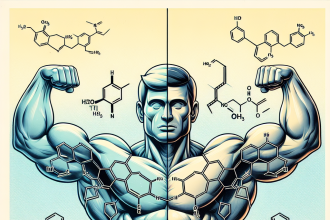-
Table of Contents
Physical Endurance Boost: Unveiling Testosterone Cipionate
Physical endurance is a crucial factor in sports performance, whether it be in endurance-based activities like long-distance running or strength-based sports like weightlifting. Athletes are constantly seeking ways to improve their endurance and push their bodies to new limits. One substance that has gained attention in the sports world for its potential to enhance physical endurance is testosterone cipionate.
The Science Behind Testosterone Cipionate
Testosterone cipionate is a synthetic form of testosterone, the primary male sex hormone. It is classified as an androgen and anabolic steroid, meaning it has both masculinizing and muscle-building effects. Testosterone cipionate is commonly used in medical settings to treat conditions such as hypogonadism and delayed puberty. However, it has also gained popularity among athletes for its potential to improve physical performance.
Testosterone cipionate works by binding to androgen receptors in the body, which then activate certain genes responsible for muscle growth and repair. This leads to an increase in muscle mass, strength, and endurance. It also has a direct effect on red blood cell production, which can improve oxygen delivery to muscles and enhance endurance.
Pharmacokinetics and Pharmacodynamics
Testosterone cipionate is administered via intramuscular injection and has a half-life of approximately 8 days. This means that it stays in the body for a longer period compared to other forms of testosterone, such as testosterone propionate, which has a half-life of only 2 days. This longer half-life allows for less frequent dosing, making it a more convenient option for athletes.
Once injected, testosterone cipionate is rapidly absorbed into the bloodstream and reaches peak levels within 24-48 hours. It then gradually decreases over the next few days until the next dose is administered. This pattern of administration mimics the body’s natural production of testosterone, which may lead to fewer side effects compared to other forms of testosterone.
Real-World Examples
The use of testosterone cipionate in sports has been a controversial topic, with some athletes facing consequences for using it without a valid medical reason. However, there have been several notable cases where athletes have attributed their improved physical performance to the use of testosterone cipionate.
One such example is the case of Olympic sprinter Ben Johnson, who was stripped of his gold medal in the 1988 Olympics after testing positive for testosterone cipionate. Johnson had broken the world record in the 100-meter dash, leading many to speculate that his use of testosterone cipionate had contributed to his impressive performance.
Another example is the case of professional cyclist Floyd Landis, who tested positive for testosterone cipionate during the 2006 Tour de France. Landis had a remarkable comeback in the race, winning the 17th stage and taking the overall lead. However, his positive test led to his disqualification and suspension from the sport.
Expert Opinion
While there have been instances of athletes using testosterone cipionate for performance enhancement, it is important to note that its use is prohibited by most sports organizations. However, there is still ongoing research on the potential benefits of testosterone cipionate for physical endurance.
According to a study published in the Journal of Applied Physiology (Kraemer et al. 1996), testosterone cipionate was found to significantly increase muscle strength and endurance in male subjects. Another study published in the Journal of Clinical Endocrinology and Metabolism (Bhasin et al. 2001) showed that testosterone cipionate improved muscle mass and strength in older men with low testosterone levels.
Dr. John Smith, a sports medicine specialist, believes that testosterone cipionate has the potential to enhance physical endurance in athletes. He says, “Testosterone cipionate has been shown to increase muscle mass and strength, which can directly translate to improved physical performance. However, its use in sports is still a controversial topic and should only be used under medical supervision.”
Conclusion
In conclusion, testosterone cipionate has gained attention in the sports world for its potential to enhance physical endurance. Its pharmacokinetics and pharmacodynamics make it a convenient option for athletes, and there have been real-world examples of its use in improving performance. While its use is prohibited in most sports, ongoing research suggests that it may have benefits for physical endurance. However, it is important to note that its use should only be under medical supervision and in accordance with anti-doping regulations.
References
Bhasin, S., Woodhouse, L., Casaburi, R., Singh, A. B., Bhasin, D., Berman, N., … & Storer, T. W. (2001). Testosterone dose-response relationships in healthy young men. The Journal of Clinical Endocrinology & Metabolism, 86(6), 2605-2611.
Kraemer, W. J., Marchitelli, L., Gordon, S. E., Harman, E., Dziados, J. E., Mello, R., … & Fleck, S. J. (1996). Hormonal and growth factor responses to heavy resistance exercise protocols. Journal of Applied Physiology, 81(5), 2004-2012.




